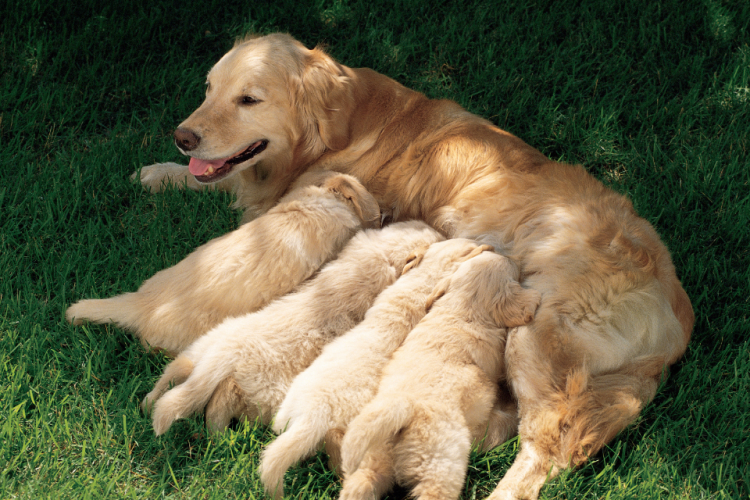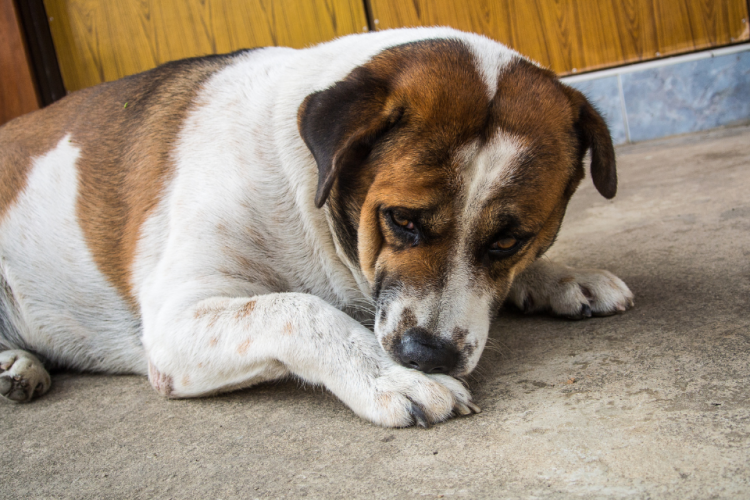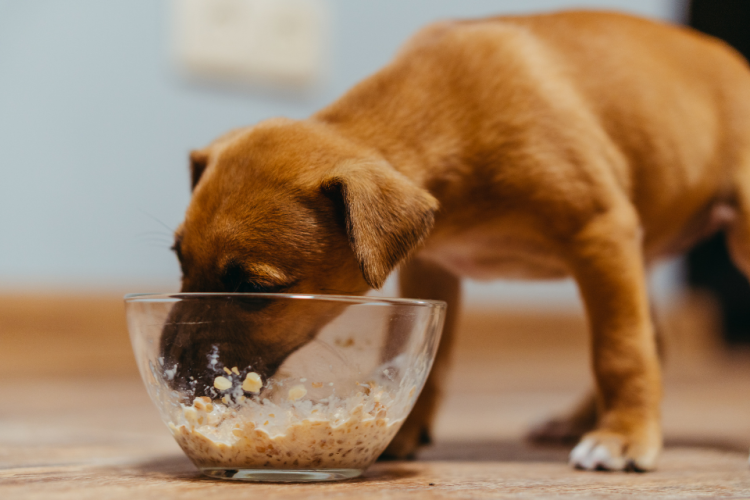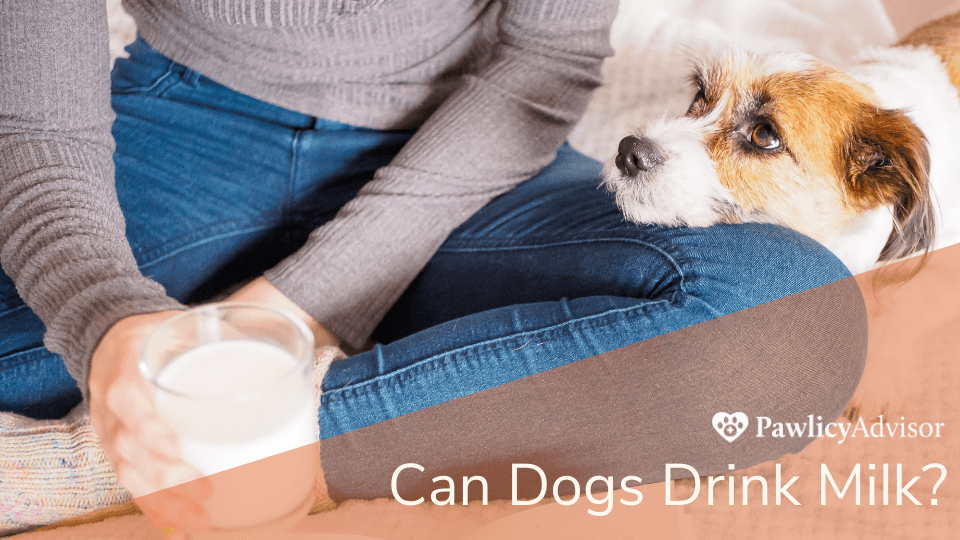The beverage may be cholk full of benefits for the humans, but can dogs drink milk - or is milk bad for dogs? Ultimately, it depends on the dog's digestive system, so the answer changes on a case-by-case basis. It's unlikely that drinking a small amount would be toxic to pets, but it should never be consumed in large volume, and some dogs should avoid it altogether.
It all comes down to lactose - a natural sugar found in milk - and your pup’s ability to digest it. Read on to learn how to tell if your dog is lactose-intolerant, how much milk is safe for dogs with strong stomachs, and more details on the presence of dairy in dogs' diet.
Table of Contents:
- Can dogs drink milk, or are dogs lactose-intolerant?
- What causes lactose-intolerance in dogs?
- What are the symptoms of lactose intolerance in dogs?
- Is milk bad or dogs?
- How much milk can dogs have?
- What kind of milk can dogs drink?
- What dairy products are safe for dogs?
- What to do if your dog drinks milk
- Key Takeaways
Pro Tip: A pet insurance plan can cover the cost of allergy testing and management, in addition to helping you afford vet care for many other illnesses and injuries covered in your policy.
Can dogs drink milk, or are dogs lactose-intolerant?
Many dogs can safely consume milk in small amounts but others are lactose-intolerant, meaning their digenstive system does not produce sufficient levels of an enzyme called lactase that's tasked with breaking down the sugar in milk, or lactose.
Dairy is the primary source of dogs' adverse food reactions, according to VCA Animal Hospitals. The severity of each response depends on how well the dog's digestive tract can process lactose and how much sugar is present in the specific food or beverage, as levels vary depending on how the dairy product is made. Some dogs can't drink milk because the sugar content is very high, though they can tolerate other types of dairy (such as cottage cheese) perfectly fine due to its significantly lower lactose levels.
What causes lactose intolerance in dogs?
Lactose intolerance is caused by undigested sugar molecules traveling through the gastrointestinal (GI) tract because they can't produce enough enzymes to break down the nutrients for absorption into the bloodstream. When it enters the colon, water is then drawn to the undigested sugar molecule, leading to a loss of water retention in the tissue walls, inflammation of the large intestine, and diarrhea consisting of loose, watery stool - a condition otherwise known as colitis in dogs.
Why can puppies drink milk?
The reason why puppies can drink milk, though many mature dogs cannot, is because puppies have an abundance of lactase enzymes that break down their mother's milk while nursing. Once they are weaned, their bodies will produce less of the enzyme to adjust to its new nutritional demands, at which point many dogs develop an intolerance.

Puppies can drink milk strictly from their mother because it's full of antibodies and necessary nutrients for healthy development. Cow's milk and other dairy sources can cause unpleasant effects on a puppy's delicate digestive system.
But, what happens if a puppy is orphaned? In circumstances where a safe alternative must be found in lieu of the mother's milk, commercial replacements are a better option than cow's milk for puppies. That's because milk from a dog is richer in calories and essential proteins, plus it's much easier for pups to digest than dairy sources. Be sure to consult your vet before choosing a suitable milk replacement for newborn puppies.
What are the symptoms of lactose intolerance in dogs?
Pets can't tell us when they're not feeling well, so it's important to keep an eye on their behavior in order to recognize the clinical signs of illness, including adverse reactions to food. The symptoms of lactose intolerance in dogs can range from mild to severe, and most often appear as:
- Loose stools
- Diarrhea
- Vomiting
- Bloating
- Flatulence
- Abdominal pain
- Cramping
- Dehydration
- Lethargy
- Lack of appetite
How to recognize lactose intolerance in dogs
Most of the time, pet parents don't knwow their dog can't drink milk until they obviously demonstrate the symptoms of lactose intolerance after consuming dairy. However, some dogs only display a mild intolerance with less clear symptoms. A vet's diagnosis is the only way to know for certain whether your dog can drink milk without issue, but you may be able to recognize the signs if you notice any of these red flags:
- Diarrhea in lactose-intolerant dogs is typically present within 12 hours of dairy consumption.
- Sudden drooling or the licking of surfaces might be a sign of nausea due to changes in the gut.
- If your dog is extra gassy or appears more bloated than usual, it could caused by a higher volume of gases produced by bacteria during the fermentation of sugar in the bowels.
- Abrupt weight loss might occur if your dog experiences a change in appetite that causes them to eat less so they can avoid GI troubles.
In other cases, lactose intolerance may be confused with a dairy allergy in dogs, which refers to the inability to tolerate the proteins in milk and can be far more serious. In addition to the symtoms above, dogs with dairy allergies might display signs such as:
- Red, inflammed skin
- Itchiness and scratching
- Hives
- Facial swelling
- Difficulty breathing
If you notice any of these adverse reactions, call your vet immediately or head to a local animal hospital. It it may lead to anaphylactic shock, an emergency medical condition that's potentially fatal without expedient treatment.
Is milk bad for dogs?
Many dogs are lactose-intolerant to at least some degree, but it should still be offered very judiciously to dogs that have stronger stomachs with no dairy sensitivity. Though they may be able to tolerate the sugar and protein, whole milk has a high fat content that could trigger vomiting and diarrhea nonetheless. It's also high in calories due to the fat and sugar content, so if dogs drink milk or eat dairy frequently, they could develop obesity or pancreatitis.

Aside from the possible long-term health consequences, dogs can drink milk safely so long as they don't have a dairy allergy and it's fed in small amounts. To stay on the safe side, be sure to speak with your vet before introducing new foods into your pet’s diet.
How much milk can dogs have?
With your vet's approval, dogs can drink a few sips of milk as an occassional treat. A few tablespoons of milk from time to time probably won’t cause them any harm, but offering larger quantities may lead to negative, short- and long-term effects.
As with all treats, it’s a good idea to follow the 90/10 rule and limit your pet’s treat intake to no more than 10% of their total daily calories.
What kind of milk can dogs drink?
There are several different types of milk beverages, and as plant-based sources become increasingly available, many pet parents wonder if their pups can also drink almond milk, oat milk, soy milk, and similar lactose drink replacements.
Can dogs drink almond milk?
Almond milk is one of the most popular plant-based types of milk, but can dogs eat almonds? Although these nuts aren't toxic to dogs, canines generally don’t digest them very well. Almonds are also high in fat, which can result in weight gain and pancreatitis if consumed in big amounts.
However, small amounts of almond milk (a couple of tablespoons) should be fine if offered as an occasional treat. Make sure to read the ingredient list of almond milk to check if it contains added sugar or xylitol, an artificial sweetener that's very harmful in dogs.
Can dogs drink oat milk?
Oat milk is another plant-based dairy alternative that is safe for dogs to drink in small quantities, as it could be difficult to digest in large volume. Oats are not toxic to canines, so this could offer a good lactose substitute for weaning puppies who like the taste as well as dogs who need additional calories to meet their nutrition requirements.

Can dogs drink coconut milk?
Coconut milk won’t harm your pet if you served in moderation. Dogs can eat coconut for the many different benefits it offers - from a softer, shinier coat to alleviated skin irritation - but keep in mind, coconut contains oils that could cause GI upset and diarrhea if dogs consume too much.
Make sure to check the ingredient list before offering your dog coconut milk, as some brands can be overly processed and can contain additives that your dog doesn’t need.
Can dogs drink soy milk?
In general, dogs digest soy products well, so soy milk in moderate quantities is not harmful to dogs. In fact, many commercial dog foods contain soy-based ingredients.
This non-dairy, plant-based milk alternative contains proteins called isoflavones that are known to reduce cholesterol in humans and, according to anecdotal evidence, can help with urinary incontinence in dogs. Some vets might even recommend supplements containing isoflavones.
Can dogs drink goat's milk?
As with all dairy products, moderation is key. Compared to cow's milk, goat’s milk is higher in some nutrients such as potassium and calcium, but lower in others, like folate and vitamin B12. Goat’s milk also contains less lactose than cow’s milk, and proponents claim that because of the differences in its protein and fat structures, lactose-intolerant dogs can drink milk from a goat with less likelihood of sensitivity and allergic reaction due to an easier digestive process.
If you’re interested in feeding your dog goat’s milk, start with a small amount to see how they tolerate it, and only serve it from time to time.
Pro Tip: If your pup snacks on something they shouldn’t, pet insurance is one way you can cover the cost of gold-standard veterinary care that may be necessary for the surgical removal should a foreign body lead to intenstinal blockage.
What dairy products are safe for dogs to eat?
Generally speaking, it’s safe to feed dogs a small amount of dairy on special occasions, as long as they do not have any known food sensitivities. It's best to offer dogs dairy products that have low lactose content, such as plain yogurt (4 grams per 1/2 cup), cottage cheese (3 grams per 1/2 cup), and cheddar cheese (0 grams of lactose).
Dogs can eat cheese in most varietals thanks to its low lactose levels, and yogurt is often beneficial in dogs with stomach upset because it contains prebiotics that can alleviate gas or diarrhea.
It may be tempting to give your dog a bite of ice cream, but be very careful and make sure to check the label for chocolate and xylitol beforehand. These two toxins are very common and extremely dangerous in canines, so exerise caution wherever it may be present.
What to do if your dog drinks milk
If your dog gets their paws on a large helping of milk, monitor for symtpoms of abdominal distress. Gastric upset will generally occur within about 12 hours after a dog drinks milk but can last for much longer, so prepare for frequent trips outside so your poor pup can relieve themselves. If you notice these signs of lactose intolerance, or a change in behavior possibly caused by dairy's adverse effects, call your vet right away.
Key Takeaways
- In general, milk served in small amounts should not cause any harm to dogs. However, many dogs are lactose-intolerant, so it is best not to give your pet milk without testing for lactose intolerance first.
- Both normal milk and lactose-free milk, as well as other dairy products like cheese and ice cream, contain fat and should only be given occasionally in small amounts as treats.
- Pups can also safely consume small amounts of plant-based milk such as soy milk, coconut milk, and almond milk.
- Talk to your vet before feeding any new human foods, and seek veterinary care if your pet starts to show signs of lactose intolerance.
